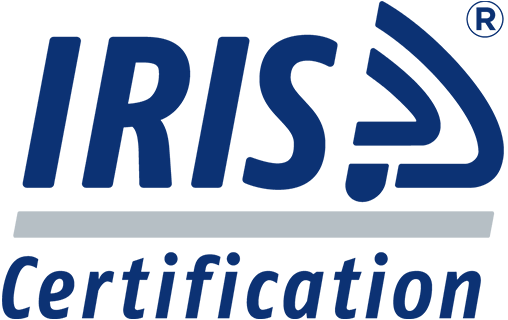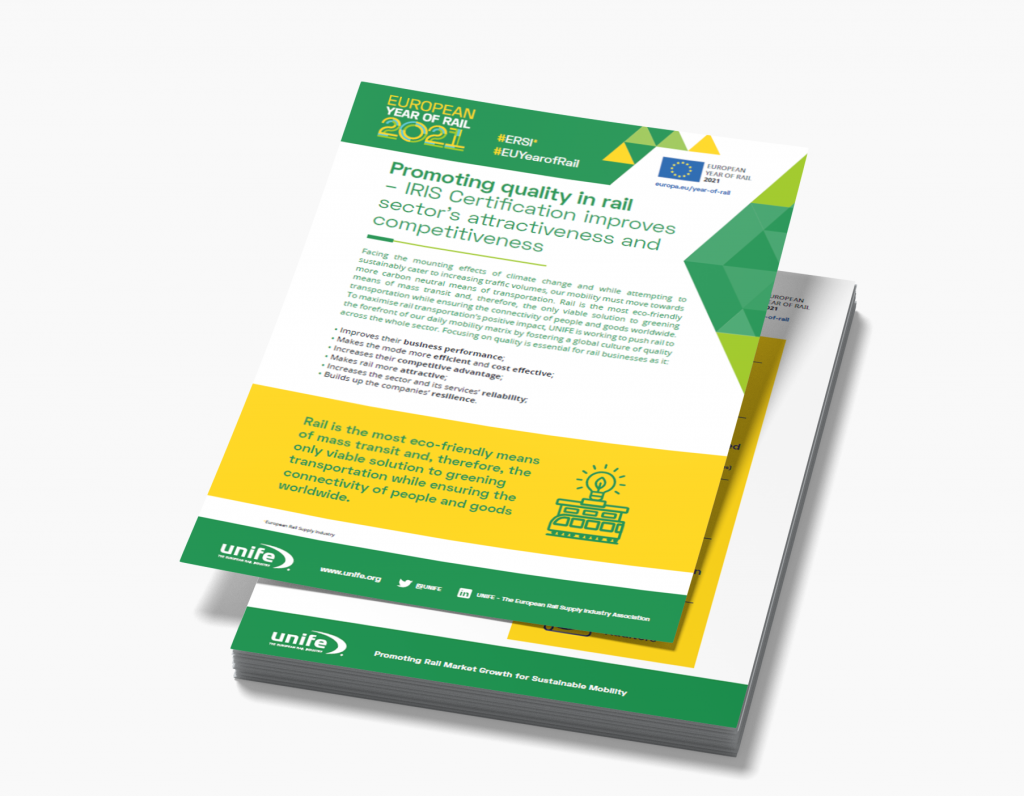Interactive Factsheet
Promoting quality in rail
– IRIS Certification improves the sector’s attractiveness and competitiveness
Facing the mounting effects of climate change and while attempting to sustainably cater to increasing traffic volumes, our mobility must move towards more carbon-neutral means of transportation. Rail is the most eco-friendly means of mass transit and, therefore, the only viable solution to greening transportation while ensuring the connectivity of people and goods worldwide. To maximise rail transportation’s positive impact, UNIFE is working to push rail to the forefront of our daily mobility matrix by fostering a global culture of quality across the whole sector. Focusing on quality is essential for rail businesses as it:
- Improves their business performance;
- Makes the mode more efficient and cost-effective;
- Increases their competitive advantage;
- Makes rail more attractive;
- Increases the sector and its services’ reliability;
- Builds up the companies’ resilience.
Rail is the most eco-friendly means of mass transit and, therefore, the only viable solution to greening transportation while ensuring the connectivity of people and goods worldwide.

Aiming to bring these benefits to the sector, rail industry companies – gathered under the umbrella of UNIFE – established the IRIS Certification scheme in 2005. IRIS, or the International Railway Industry Standard, is a unique global system for the evaluation of companies supplying the railway industry. The scheme comprises of:
- ISO/TS 22163:2017 – the standard specifying business management system requirements for rail organisations. The standard functions as a formula describing the best practices for business management in the rail sector. This document is owned and managed by the International Organisation for Standardisation (ISO).
- IRIS Certification Conformity assessment:2020 – fulfilling the requirements outlined in the standard does not automatically grant a company an IRIS Certificate. In addition to fulfilling the requirements specified in ISO/TS 22163:2017, the IRIS Conformity assessment:2020 defines rules and procedures that must be followed in order to be awarded the certificate.
- IRIS Certification Technology – IRIS Technology enables the IRIS Certification scheme to function. Consisting of the IRIS portal, the Audit-Tool and the database, IRIS Technology offers the necessary tools for awarding and maintaining the IRIS Certification scheme, as well as supporting companies in the preparation of the audit.
QUICK FACTS ON
IRIS CERTIFICATION:
The IRIS Certification scheme holds esteem throughout the rail sector and the world as:
- It brings together the best practices from quality cooperation observed between the rail sector’s biggest players
- The system is objective and transparent as only IRIS-approved independent certification bodies are entitled to conduct IRIS Certification audits. All auditors have to undergo a training at UNIFE to be allowed to offer their services.
- All IRIS Certificates are awarded together with a quality performance level statement. This allows the assessors to differentiate companies based on their quality performance and ensure the certification remains a depiction of a company’s quality. Companies can be awarded either Bronze, Silver or Gold level certification based on their audit score and feedback received from their customers.
IRIS Certification is a tool that is enabling the sector to reach higher quality objectives. The system brings the following benefits to every segment of the rail sector:

IRIS Benefits for
Equipment Manufacturers
Equipment manufacturers are able to improve their quality level and promote themselves as providing greater quality. This enhances equipment manufacturers’ competitiveness while increasing their market value and visibility.
Following the best practices required for obtaining the IRIS Certification allows equipment manufacturers to enhance business management systems and increase efficiency. This, in turn, results in lower costs, higher product quality and improved customer satisfaction. Equipment manufacturers are also able to benefit from increased visibility by being listed as a certified company on the IRIS Portal.

IRIS Benefits for System Integrators
A uniform quality standard considerably simplifies the process of evaluating and approving suppliers, removing the need for system integrators‘ own approval audits.
Now, system integrators are able to access accurate and reliable data through the common IRIS web database.

IRIS Benefits for Rail
Operators
Operators capitalise from improvements made across the entire supply chain, which result in enhanced equipment, rolling stock and signalling. They are able to rely on a demanding, internationally recognised standard for the whole industry. As a result, quality, safety and reliability increase alongside the industry’s business management processes.
Operators have also actively contributed to the development of IRIS Certification rules through their participation to the International Rail Quality Board (IRQB).

Through quality cooperation, IRIS Certification has built trust within the sector between numerous companies who usually act as competitors on the global market. This cooperation was taken a step further in 2018 with the foundation of the IRQB – a global consortium composed of rail operators, system integrators and equipment manufacturers. Its founding demonstrated the rail sector’s high commitment to quality and a widespread trust in the IRIS Certification scheme as the perfect tool for enhancing quality in the sector. IRQB aims to:
- Contribute to enhancing the rail sector’s attractiveness and competitiveness globally by striving towards improved product quality
- Support, develop and implement the IRIS Certification system throughout both the global rail sector and supply chain
- Promote cooperation among all relevant stakeholders with a view to fostering a culture of quality throughout the rail sector
Its founding demonstrated the rail sector’s high commitment to quality and a widespread trust in the IRIS Certification scheme as the perfect tool for enhancing quality in the sector.
